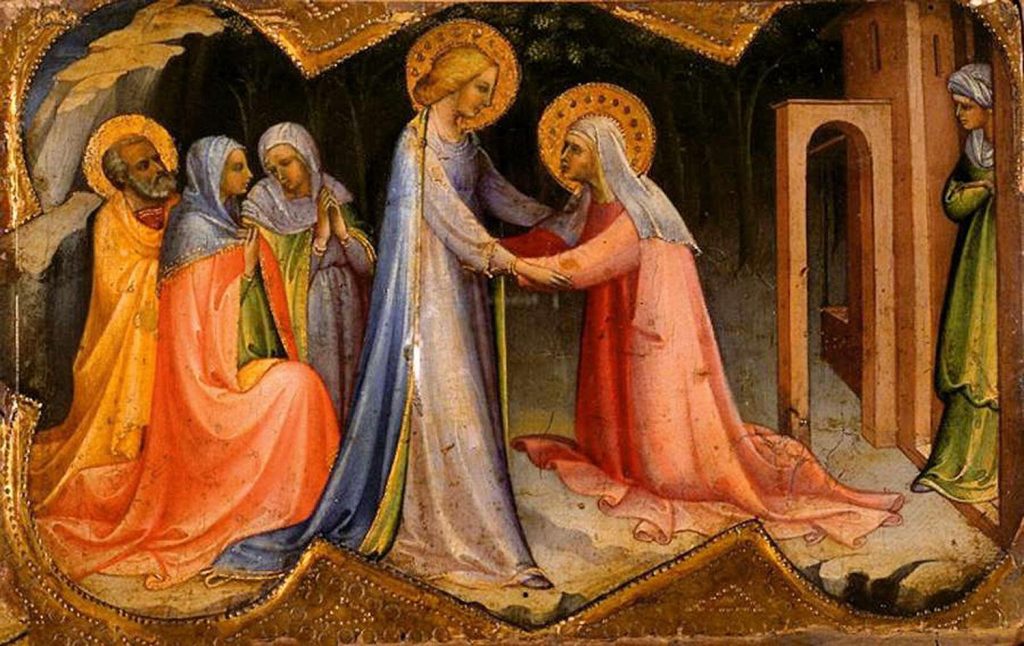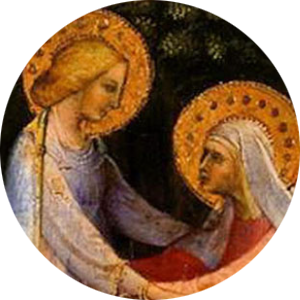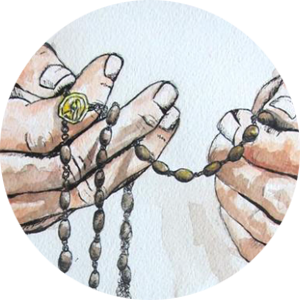The Holy Rosary
![]()
The story of the Rosary
The History of the Rosary
Rev Fr. William Saunders

The rosary is one of the most cherished prayers of our Catholic Church. Introduced by the Creed, the Our Father, three Hail Marys and the Doxology (“Glory Be”), and concluded with the Salve Regina, the rosary involves the recitation of five decades consisting of the Our Father, 10 Hail Marys and the Doxology. During this recitation, the individual meditates on the saving mysteries of our Lord’s life and the faithful witness of our Blessed Mother.
Journeying through the Joyful, Sorrowful and Glorious mysteries of the rosary, the individual brings to mind our Lord’s incarnation, His passion and death and His resurrection from the dead. In so doing, the rosary assists us in growing in a deeper appreciation of these mysteries, in uniting our life more closely to our Lord and in imploring His graced assistance to live the faith. We also ask for the prayers of our Blessed Mother, who leads all believers to her Son.
The origins of the rosary are “sketchy” at best. The use of “prayer beads” and the repeated recitation of prayers to aid in meditation stem from the earliest days of the Church and has roots in pre-Christian times. Evidence exists from the Middle Ages that strings of beads were used to count Our Fathers and Hail Marys. Actually, these strings of beads became known as “Paternosters,” the Latin for “Our Father.”
The structure of the rosary gradually evolved between the 12th and 15th centuries. Eventually 50 Hail Marys were recited and linked with verses of psalms or other phrases evoking the lives of Jesus and Mary. During this time, this prayer form became known as the rosarium (“rose garden”), actually a common term to designate a collection of similar material, such as an anthology of stories on the same subject or theme. During the 16th century, the structure of the five-decade rosary based on the three sets of mysteries prevailed.
In 1922, Dom Louis Cougaud stated, “The various elements which enter into the composition of that Catholic devotion commonly called the rosary are the product of a long and gradual development which began before St. Dominic’s time, which continued without his having any share in it, and which only attained its final shape several centuries after his death.” However, other scholars would rebut that St. Dominic not so much “invented” the rosary as he preached its use to convert sinners and those who had strayed from the faith. Moreover, at least a dozen popes have mentioned St. Dominic’s connection with the rosary, sanctioning his role as at least a “pious belief.”
The rosary gained greater popularity in the 1500s, when Moslem Turks were ravaging Eastern Europe. Recall that in 1453, Constantinople had fallen to the Moslems, leaving the Balkans and Hungary open to conquest. With Moslems raiding even the coast of Italy, the control of the Mediterranean was now at stake.
In 1571, Pope Pius V organized a fleet under the command of Don Juan of Austria the half-brother of King Philip 11 of Spain. While preparations were underway, the Holy Father asked all of the faithful to say the rosary and implore our Blessed Mother’s prayers, under the title Our Lady of Victory, that our Lord would grant victory to the Christians. Although the Moslem fleet outnumbered that of the Christians in both vessels and sailors, the forces were ready to meet in battle. The Christian flagship flew a blue banner depicting Christ crucified. On October 7, 1571, the Moslems were defeated at the Battle of Lepanto. The following year, Pope St. Pius V established the Feast of the Holy Rosary on October 7, where the faithful would not only remember this victory, but also give thanks to the Lord for all of His benefits and remember the powerful intercession of our Blessed Mother.
The fact that our Church continues to include the Feast of the Holy Rosary on the liturgical calendar testifies to the importance and goodness of this form of prayer. Archbishop Fulton Sheen said, “The rosary is the book of the blind, where souls see and there enact the greatest drama of love the world has ever known; it is the book of the simple, which initiates them into mysteries and knowledge more satisfying than the education of other men; it is the book of the aged, whose eyes close upon the shadow of this world, and open on the substance of the next. The power of the rosary is beyond description.”
Benefits of the Rosary
15 Promises of the Rosary
(Given to St. Dominic and Blessed Alan de la Roche)

1. Whoever shall faithfully serve me by the recitation of the Rosary, shall receive powerful graces.
2. I promise my special protection and the greatest graces to all those who shall recite the Rosary.
3. The Rosary shall be a powerful armor against hell, it will destroy vice, decrease sin, and defeat heresies
4. It will cause virtue and good works to flourish; it will obtain for souls the abundant mercy of God; it will withdraw the hearts of people from the love of the world and its vanities, and will lift them to the desire of eternal things. Oh, that souls would sanctify themselves by this means.
5. The soul which recommends itself to me by the recitation of the Rosary, shall not perish.
6. Whoever shall recite the Rosary devoutly, applying Himself to the consideration of its Sacred Mysteries shall never be conquered by misfortune. God will not chastise Him in His justice, he shall not perish by an unprovided death; if he be just, he shall remain in the grace of God, and become worthy of eternal life.
7. Whoever shall have a true devotion for the Rosary shall not die without the Sacraments of the Church.
8. Those who are faithful to recite the Rosary shall have during their life and at their death the light of God and the plentitude of His graces; at the moment of death they shall participate in the merits of the Saints in Paradise.
9. I shall deliver from purgatory those who have been devoted to the Rosary.
10. The faithful children of the Rosary shall merit a high degree of glory in Heaven.
11. You shall obtain all you ask of me by the recitation of the Rosary.
12. All those who propagate the Holy Rosary shall be aided by me in their necessities.
13. I have obtained from my Divine Son that all the advocates of the Rosary shall have for intercessors the entire celestial court during their life and at the hour of death
14. All who recite the Rosary are my children, and brothers and sisters of my only Son, Jesus Christ.
15. Devotion of my Rosary is a great sign of predestination.
Indulgences for Praying the Rosary.
An Indulgence is the remission before God of the temporal punishment due for sins which have already been forgiven as far as their guilt is concerned.
Indulgences are granted by God through the Catholic Church which, as minister of the Redemption, dispenses and applies the treasury of the satisfaction won by Christ and the Saints.
Though the guilt of sin and the eternal punishment it may have merited are remitted by sacramental absolution, measurable punishment before or after death is still required in order to satisfy God’s justice, even for sins already forgiven. To the extent we fail to atone sufficiently for our sins during our lifetimes on earth, we will suffer for a given “time” in Purgatory. An Indulgence cancels or lessens this non-eternal punishment.
In order to gain an Indulgence, one must be Baptized, not excommunicated, and in the state of grace at least at the completion of the prescribed work. In order to gain Indulgences, one must have at least a general intention of gaining them. If at the beginning of the day we make an intention to gain all the Indulgences we can that day, we do not have to make this intention each time we perform a work to which an Indulgence is attached. An Indulgence may be gained for oneself or may be offered for Souls in Purgatory, but may not be applied to another living person.
A plenary Indulgence remits all the punishment due for sin and makes possible immediate entrance into Heaven after death.
The New Norms
To gain a plenary Indulgence, it is necessary to perform the work to which the Indulgence is attached and to fulfill three conditions: sacramental Confession, Eucharistic Communion, and prayer for the intentions of the Pope. (The recitation of one Our Father and one Hail Mary fully suffices, though we are free to say any other prayer we desire.) It is further required that all attachment to sin, even venial sin, be absent. If the latter disposition is in any way less than complete or if the three prescribed conditions are not fulfilled, the Indulgence will be only partial.
The three conditions may be fulfilled several days before or several days after performing the prescribed work; nevertheless, it is fitting that Communion be received and prayer for the Pope’s intentions be said the same day the work is performed.
A single Confession suffices for gaining several plenary Indulgences. However, one must receive Holy Communion and pray for the Pope’s intentions for each plenary Indulgence. To be able to gain a daily plenary Indulgence, one should go to Confession at least every two weeks.
Only one plenary Indulgence can be acquired each day, unless a person is at the point of death. In that event, even after gaining a plenary Indulgence that day, one can gain the plenary Indulgence for the moment of death.
A partial Indulgence remits only part of the punishment due for sin and is now granted without designation of a specific number of “days” or “years.” The faithful who, at least with a contrite heart, perform an action or recite a prayer to which a partial Indulgence is attached, obtain, in addition to the remission of temporal punishment acquired by the action itself, an equal remission of punishment through the intervention of the Church. The amount remitted depends on the person’s fervor, on the greatness of the sacrifice, and on how perfectly the act is performed. Any number of partial Indulgences can be acquired per day, unless otherwise indicated.
A plenary indulgence is granted for reciting five decades of the Rosary in a church or public oratory or in a family group, religious community or pious association. A partial indulgence is granted in other circumstances. The five decades must be recited continuously. The vocal recitation must be accompanied by pious meditation on the mysteries. In public recitation the mysteries must be announced in the manner customary in the place; for private recitation, however, it suffices if the vocal recitation is accompanied by meditation on the mysteries.
Blessing of the Rosary
1. Sinners are forgiven.
2. Souls that thirst are refreshed.
3. Those who are fettered have their bonds broken.
4. Those who weep find happiness
5. Those who are tempted find peace.
6. The poor find help.
7. Religious are reformed.
8. Those who are ignorant are instructed.
9. The living learn to overcome pride.
10. The dead (the Holy Souls) have their pains eased by suffrages.
Benefits of the Rosary
1. It gradually gives us a perfect knowledge of Jesus Christ.
2. It purifies our souls, washing away sin.
3. It gives us victory over all our enemies.
4. It makes it easy for us to practice virtue.
5. It sets us on fire with love of Our Lord.
6. It enriches us with graces and merits.
7. It supplies us with what is needed to pay all our debts to God and to our fellow men; and finally, it obtains all kinds of graces for us from Almighty God.




